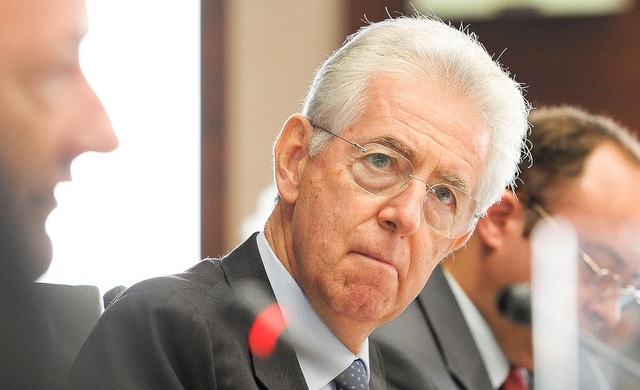Italian shares fell sharply and government borrowing costs soared after Mario Monti’s decision to resign earlier than expected. The yield on 10-years Italian bonds rose 28 base points above 4.8% on a two week high, while the main stock market fell 3.3%. The plunge arrived after the announcement by the former Prime Minister Silvio Berlusconi to run for the next elections, which will be probably held in February, and by the markets’ notorious diffidence towards Italian traditional politics.

Among individual shares, banks suffered the most. Unicredit fell 4.9%, Banca dei Monti dei Paschi fell 6% and Banca Popolare di Milano declined 6% as well. German banks, along with Spanish and French, endured a difficult morning, spreading the fear that without Mr Monti and his strong pro-European belief, the entire unity of EU is at risk.
Mr Monti lead a one-year technocratic government that replaced last Silvio Berlusconi’s coalition when Italian bond yields reached a record of 7.48% in November 2011 and the spread between them and German equivalent leapt to the record of 574 basis points (the danger threshold is usually located around 400 basis points). Early last week, Italian 10-year bonds were trading on yields below 4.4%, the lowest for two years. It was Berlusconi’s party, Il Popolo della Liberta’ (The People of Freedom),who withdrew its support to the technocratic government, claiming for less austerity and for a EU not flattened over a German dominant position.
The government will approve the budget and financial stability law before stepping down. Many politicians of the centre are encouraging Mario Monti to run for the next elections, while the left-wing coalition, conspicuously ahead in the polls, claims for more social oriented-policies to avoid a massive unemployment. “We will respect the very stringent commitments taken” said Pierluigi Bersani, the Secretary of Democratic Party and leader of the centre left to The Wall Street Journal “and we will take them on as our own”. On the other hand, Mr Berlusconi is raising some eurosceptic issues that fear investors and global markets, as well as many Italians.
“The question mark is on the the stability and credibility of our country now” said Vinicio Peluffo, an Italian MP of the Democratic Party quoted to ADVFN Financial News. “This is the result of the immediate effect of Berlusconi’s come back: Italy cannot really go on without Mr Monti and we, as the centre-left, we want to involve him in a new government”.
“Global investors follow the ECB” said Claudio Borghi, economist and columinst of the right-wing Italian newspaper Il Giornale, expressed to ADVFN Financial News. “Nobody actually thinks that Berlusconi could win again: it’s not his fault, it’s the Italian situation to be extremely precarious. The failure of Monti is in the numbers of his government that brought Italy in a deeper recession. The country should get out of the EU: the cost of being in is higher than the advantages we have”.
Italian GDP is expected to shrink 2.3% this year and its national debt is forecast to rise to 126% of GDP according to the European Commission. The country’s unemployment hit the record of 11.1% in October, the highest level since January 2004.

 Hot Features
Hot Features












